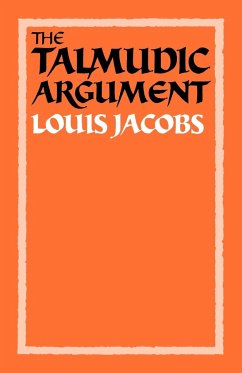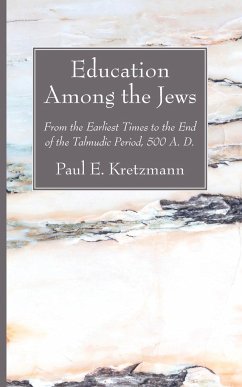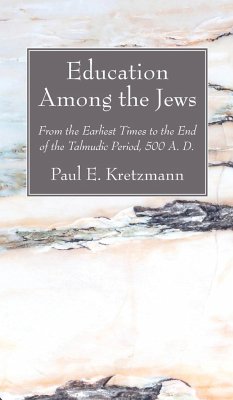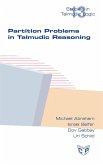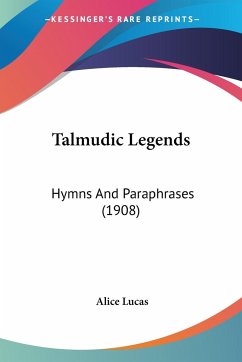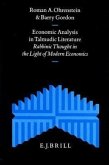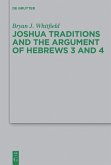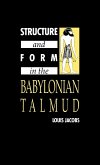Maryce Jacobs Ed., Louis Jacobs, Maryce Ed Jacobs
The Talmudic Argument
A Study in Talmudic Reasoning and Methodology
Maryce Jacobs Ed., Louis Jacobs, Maryce Ed Jacobs
The Talmudic Argument
A Study in Talmudic Reasoning and Methodology
- Broschiertes Buch
- Merkliste
- Auf die Merkliste
- Bewerten Bewerten
- Teilen
- Produkt teilen
- Produkterinnerung
- Produkterinnerung
This book examines in detail a number of typical lengthy passages with a view to showing how Talmudic reasoning operates and how the Talmud was compiled by its final editors.
Andere Kunden interessierten sich auch für
![Education Among the Jews Education Among the Jews]() Paul E. KretzmannEducation Among the Jews15,99 €
Paul E. KretzmannEducation Among the Jews15,99 €![Education Among the Jews Education Among the Jews]() Paul E. KretzmannEducation Among the Jews31,99 €
Paul E. KretzmannEducation Among the Jews31,99 €![Partition Problems in Talmudic Reasoning Partition Problems in Talmudic Reasoning]() Michael AbrahamPartition Problems in Talmudic Reasoning34,99 €
Michael AbrahamPartition Problems in Talmudic Reasoning34,99 €![Talmudic Legends Talmudic Legends]() Alice LucasTalmudic Legends23,99 €
Alice LucasTalmudic Legends23,99 €![Economic Analysis in Talmudic Literature: Rabbinic Thought in the Light of Modern Economics Economic Analysis in Talmudic Literature: Rabbinic Thought in the Light of Modern Economics]() Barry GordonEconomic Analysis in Talmudic Literature: Rabbinic Thought in the Light of Modern Economics148,99 €
Barry GordonEconomic Analysis in Talmudic Literature: Rabbinic Thought in the Light of Modern Economics148,99 €![Joshua Traditions and the Argument of Hebrews 3 and 4 Joshua Traditions and the Argument of Hebrews 3 and 4]() Bryan J. WhitfieldJoshua Traditions and the Argument of Hebrews 3 and 4109,99 €
Bryan J. WhitfieldJoshua Traditions and the Argument of Hebrews 3 and 4109,99 €![Structure and Form in the Babylonian Talmud Structure and Form in the Babylonian Talmud]() Louis JacobsStructure and Form in the Babylonian Talmud106,99 €
Louis JacobsStructure and Form in the Babylonian Talmud106,99 €-
-
-
This book examines in detail a number of typical lengthy passages with a view to showing how Talmudic reasoning operates and how the Talmud was compiled by its final editors.
Hinweis: Dieser Artikel kann nur an eine deutsche Lieferadresse ausgeliefert werden.
Hinweis: Dieser Artikel kann nur an eine deutsche Lieferadresse ausgeliefert werden.
Produktdetails
- Produktdetails
- Verlag: Cambridge University Press
- Seitenzahl: 240
- Erscheinungstermin: 5. Mai 2008
- Englisch
- Abmessung: 216mm x 140mm x 15mm
- Gewicht: 344g
- ISBN-13: 9780521269483
- ISBN-10: 0521269482
- Artikelnr.: 24724470
- Herstellerkennzeichnung
- Books on Demand GmbH
- In de Tarpen 42
- 22848 Norderstedt
- info@bod.de
- 040 53433511
- Verlag: Cambridge University Press
- Seitenzahl: 240
- Erscheinungstermin: 5. Mai 2008
- Englisch
- Abmessung: 216mm x 140mm x 15mm
- Gewicht: 344g
- ISBN-13: 9780521269483
- ISBN-10: 0521269482
- Artikelnr.: 24724470
- Herstellerkennzeichnung
- Books on Demand GmbH
- In de Tarpen 42
- 22848 Norderstedt
- info@bod.de
- 040 53433511
1. The Talmudic argument; 2. The literary form of the Babylonian Talmud; 3.
Ber¿rah: retrospective specification; 4. Yeush she-lo mi-da`at: unconscious
abandonment of property; 5. Rubba: probability; 6. Davar she-lo ba
le-'olam: conveyance of a thing not yet in existence; 7. Kol she-eyno
be-zeh ahar zeh afilu be-vat ahat eyno: whatever cannot be established in a
consecutive sequence cannot be established even in a simultaneous sequence;
8. Yesh horesh telem ehad: a single act of ploughing can result in a number
of penalties; 9. Simanin de-oraita o de-rabbanan: whether reliance on
distinguishing marks for the purpose of identification is Biblical or
Rabbinic; 10. Devarim she-be-lev e nam devarim: mental reservations in
contracts are disregarded; 11. Hazakah: presumptive state; 12. Gadol kevod
ha-beriot: the law and regard for human dignity; 13. Hazmanah milts:
whether the designation of an object for a particular use is effective; 14.
Mitzvat laseh she-ha-zeman geramah: positive precepts dependent on time
from which women are exempt; 15. Heyzek she-eyno nikar: indiscernible
damage to property; 16. Kinyan hatzer: acquisition by means of a domain;
17. Palginan be-dibbura: admission of part of a testimony even though
another part of the same testimony is rejected; 18. Tadir u-mekuddash:
which takes precedence: the more constant or the more sacred?; 19. Palga
nizka: the nature of the payment of half-damages to which the owner of a
goring ox is liable; 20. Patur mi-diney adam ve-hayyav be-diney shamayim:
cases where there is liability in the eyes of God even though the human
courts cannot enforce payment; 21. Mahal 'al kevodo kevodo mahul:
renunciation of honour by one to whom it is due; 22. Conclusions.
Ber¿rah: retrospective specification; 4. Yeush she-lo mi-da`at: unconscious
abandonment of property; 5. Rubba: probability; 6. Davar she-lo ba
le-'olam: conveyance of a thing not yet in existence; 7. Kol she-eyno
be-zeh ahar zeh afilu be-vat ahat eyno: whatever cannot be established in a
consecutive sequence cannot be established even in a simultaneous sequence;
8. Yesh horesh telem ehad: a single act of ploughing can result in a number
of penalties; 9. Simanin de-oraita o de-rabbanan: whether reliance on
distinguishing marks for the purpose of identification is Biblical or
Rabbinic; 10. Devarim she-be-lev e nam devarim: mental reservations in
contracts are disregarded; 11. Hazakah: presumptive state; 12. Gadol kevod
ha-beriot: the law and regard for human dignity; 13. Hazmanah milts:
whether the designation of an object for a particular use is effective; 14.
Mitzvat laseh she-ha-zeman geramah: positive precepts dependent on time
from which women are exempt; 15. Heyzek she-eyno nikar: indiscernible
damage to property; 16. Kinyan hatzer: acquisition by means of a domain;
17. Palginan be-dibbura: admission of part of a testimony even though
another part of the same testimony is rejected; 18. Tadir u-mekuddash:
which takes precedence: the more constant or the more sacred?; 19. Palga
nizka: the nature of the payment of half-damages to which the owner of a
goring ox is liable; 20. Patur mi-diney adam ve-hayyav be-diney shamayim:
cases where there is liability in the eyes of God even though the human
courts cannot enforce payment; 21. Mahal 'al kevodo kevodo mahul:
renunciation of honour by one to whom it is due; 22. Conclusions.
1. The Talmudic argument; 2. The literary form of the Babylonian Talmud; 3.
Ber¿rah: retrospective specification; 4. Yeush she-lo mi-da`at: unconscious
abandonment of property; 5. Rubba: probability; 6. Davar she-lo ba
le-'olam: conveyance of a thing not yet in existence; 7. Kol she-eyno
be-zeh ahar zeh afilu be-vat ahat eyno: whatever cannot be established in a
consecutive sequence cannot be established even in a simultaneous sequence;
8. Yesh horesh telem ehad: a single act of ploughing can result in a number
of penalties; 9. Simanin de-oraita o de-rabbanan: whether reliance on
distinguishing marks for the purpose of identification is Biblical or
Rabbinic; 10. Devarim she-be-lev e nam devarim: mental reservations in
contracts are disregarded; 11. Hazakah: presumptive state; 12. Gadol kevod
ha-beriot: the law and regard for human dignity; 13. Hazmanah milts:
whether the designation of an object for a particular use is effective; 14.
Mitzvat laseh she-ha-zeman geramah: positive precepts dependent on time
from which women are exempt; 15. Heyzek she-eyno nikar: indiscernible
damage to property; 16. Kinyan hatzer: acquisition by means of a domain;
17. Palginan be-dibbura: admission of part of a testimony even though
another part of the same testimony is rejected; 18. Tadir u-mekuddash:
which takes precedence: the more constant or the more sacred?; 19. Palga
nizka: the nature of the payment of half-damages to which the owner of a
goring ox is liable; 20. Patur mi-diney adam ve-hayyav be-diney shamayim:
cases where there is liability in the eyes of God even though the human
courts cannot enforce payment; 21. Mahal 'al kevodo kevodo mahul:
renunciation of honour by one to whom it is due; 22. Conclusions.
Ber¿rah: retrospective specification; 4. Yeush she-lo mi-da`at: unconscious
abandonment of property; 5. Rubba: probability; 6. Davar she-lo ba
le-'olam: conveyance of a thing not yet in existence; 7. Kol she-eyno
be-zeh ahar zeh afilu be-vat ahat eyno: whatever cannot be established in a
consecutive sequence cannot be established even in a simultaneous sequence;
8. Yesh horesh telem ehad: a single act of ploughing can result in a number
of penalties; 9. Simanin de-oraita o de-rabbanan: whether reliance on
distinguishing marks for the purpose of identification is Biblical or
Rabbinic; 10. Devarim she-be-lev e nam devarim: mental reservations in
contracts are disregarded; 11. Hazakah: presumptive state; 12. Gadol kevod
ha-beriot: the law and regard for human dignity; 13. Hazmanah milts:
whether the designation of an object for a particular use is effective; 14.
Mitzvat laseh she-ha-zeman geramah: positive precepts dependent on time
from which women are exempt; 15. Heyzek she-eyno nikar: indiscernible
damage to property; 16. Kinyan hatzer: acquisition by means of a domain;
17. Palginan be-dibbura: admission of part of a testimony even though
another part of the same testimony is rejected; 18. Tadir u-mekuddash:
which takes precedence: the more constant or the more sacred?; 19. Palga
nizka: the nature of the payment of half-damages to which the owner of a
goring ox is liable; 20. Patur mi-diney adam ve-hayyav be-diney shamayim:
cases where there is liability in the eyes of God even though the human
courts cannot enforce payment; 21. Mahal 'al kevodo kevodo mahul:
renunciation of honour by one to whom it is due; 22. Conclusions.

